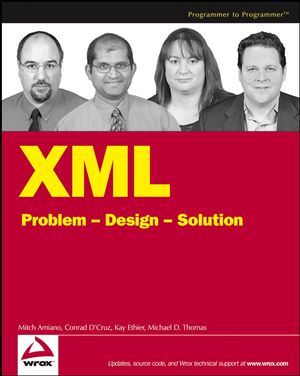XML: Problem - Design - SolutionISBN: 978-0-471-79119-5
Paperback
333 pages
June 2006
 This title is out-of-print and not currently available for purchase from this site.
|
Acknowledgments ix
Introduction xvii
Chapter 1: XML and the Enterprise 1
Problem 1
Design 2
A Brief History of XML 2
Understanding XML Basics 4
Exploring the Winery Markup Example 5
Determining an Information Model for the Winery XML 6
Problems That XML Addresses 10
Solution 17
Summary 17
Chapter 2: Well-Formed XML 19
Problem 19
Design 19
Producing a Well-Formed XML Document 20
Introducing Valid XML 23
Developing Your Structure 23
Solution 23
Summary 24
Chapter 3: Creating and Distributing a Structure for Shared Information 25
Problem 25
Design 26
Creating a Document Structure (Information Model) 26
Examining the Structure at the Outset 27
Revising the Structure 33
Solution 35
Summary 38
Chapter 4: Presenting XML Directly 39
Problem 39
Promoting Product Online 39
Pertinent Product Data 40
Extracting Requirements 41
Design 41
Technical Motivation 41
Structure of the Design 42
Applicable Technologies 46
Design Consequences 47
Solution 47
Product Line Sketch 48
Product Data — Raw XML 48
Wine List, First Draft 51
Wine List, Second Draft 54
Final Cut 56
Summary 58
Chapter 5: Converting XML Content Online 59
Problem 59
Presenting a Comprehensive View 60
Pertinent Wine Data 61
Objective 64
Design 65
Technical Motivation 65
Structure of Design 65
Applicable Technologies 71
Design Consequences 72
Solution 72
Product Data: Raw XML 74
Online Data Sheet 74
Online Data Sheet, Second Draft 86
Final Cut 91
Summary 94
Chapter 6: Rendering XML to Print 97
Problem 97
Presenting a High-Fidelity Image 97
Objectives 98
Design 98
Structure of Design 99
Applicable Technologies 105
Design Consequences 106
Solution 106
Product Data — Layout 107
Wine Brochure Formatting Objects 108
Summary 122
Chapter 7: Targeting Your Audience 123
Problem 123
Design 125
xml:lang 125
Entities 129
XPath Features for xml:lang 130
Pertinent XML Data 130
Applicable Technologies 131
Solution 131
Parameterizing a Transform 131
A Stage in the Pipe 133
Lookup Tables 136
Filtering 138
Refinements 141
Domain-Specific Languages 144
Resources and Further Reading 145
Summary 146
Chapter 8: Searching and Merging XML Documents 147
Problem 147
Design 148
How XQuery Works 148
Some Alternatives 149
XQuery Concepts 157
Solution 181
Summary 184
Chapter 9: Integrating XML with the Rest of Your Data 185
Problem 185
Design 186
Creating XML from Relational Data with SQL/XML 186
XQuery and Relational Data 191
Understanding Native XML and XML-Enhanced Relational Databases 196
SQL with XML Extensions 197
Solution 199
Generating XML from Relational Data 199
Including Relational Data in XQuery Queries 201
Including XML in SQL Queries 202
Summary 204
Chapter 10: Transforming Business Documents 205
Problem 205
Converting XML Catalogs 206
Converting Other Business Documents 208
Design 212
Custom Software Solutions 213
Common Languages 213
Industry Standards 213
Solution 215
Custom Applications 215
Transformation Sheets 216
XML Pipelines 223
Pipeline Implementations 226
Summary 230
Chapter 11: Consuming Data with Web Services and Syndication 231
Problem 231
Design 232
Understanding Web Services 233
Web Services and the World Wide Web 233
RSS 235
REST Web Services 236
SOAP Web Services Standards 237
Solution 246
Integrating an RSS Feed 246
Consuming the Amazon Web Service from a Web Application 247
Integrating an eBay Web Service with an Inventory System 250
Consuming Partner Web Service 251
Summary 251
Chapter 12: Providing Web Services 253
Problem 253
Design 253
RSS Feeds 254
Creating REST-Style Services 256
SOAP/WSDL Web Services 257
Service-Oriented Architecture 258
Interoperability 262
Solution 262
Summary 264
Chapter 13: Combining Catalogs 265
Problem 265
Combining Structured Relational Data 266
Combining XML Documents 267
Design 267
Merging XML Data: Big Bang versus Wave Approach 268
Guaranteeing the Content from Each Source 269
Choosing Merge Points 271
Solution 273
Database Integration 273
Application Integration 274
Service-Oriented Architecture 276
Content Integration 277
Summary 278
Chapter 14: Integrating and Automating Business Processes 281
Problem 282
The Value Proposition of Partnerships 283
The Challenges of Integrating Data and Systems 283
Business Process Integration and Workflow 285
Business Process Integration 287
Design 287
Business Process Reengineering 287
Patterns for Business Process Integration 288
Leveraging Technology for Process Integration 289
Solution 290
The Winery Operations 291
The Supply Chain 292
The Benefits of Integration and Automation 296
Summary 297
Appendix A: Tools 299
XSLT Engines 299
Saxon 299
Xalan 301
XSL-FO Processors 302
FOP 302
XED 304
XSL Formatter 304
Browsers 304
Mozilla/Firefox 304
Internet Explorer 6 304
Editors and IDEs 304
oXygen XML 304
Trang 305
Turbo XML 305
XMLSpy 305
Stylus Studio 305
XMetaL 305
Graphic Editors 306
GIMP 306
Inkscape 306
Appendix B: Additional Reading 307
Appendix C: Online Resources 309
Glossary 311
Index 315



